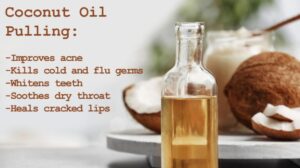You could go to the dentist for a variety of things, from routine cleanings to dental work. Social media has recently been seen as helping to spread the word about the oil-pulling method for preserving good dental health.
You should speak to your dentist before attempting the oil-pulling trend that has taken over social media. Our skilled and qualified dentists at Partha Dental will explain the oil-pulling method in detail.
What is oil pulling, and how does it work?
- An ancient practice known as oil pulling has been used to treat a variety of Dental problems. It works well to reduce inflammation, whitens teeth, freshens your breath, and clean the mouth. It can aid in the prevention of ailments like gum disease, arthritis, and eczema.
- According to oil-pulling practitioners, bacteria and toxins that build up in the body may eventually find their way into the mouth.
- They claim that you can “draw” these toxins out of the body through the soft tissue in the mouth by holding and swishing oil in your mouth for an extended period of time (about 15-20 minutes in most cases).
- To remove the toxins from the body, the oil is first sufficiently swirled before being spat out into the sink or trash.
- Oil pulling is done with a variety of oils, such as coconut, palm, olive, and sesame. The most widely used oil for oil pulling is coconut oil, which has the drawback of solidifying at around 76 degrees Fahrenheit or lower. Every month, however, is far hotter than that.
- Despite the fact that the oil may initially be solid when put in the mouth, it will quickly turn into a liquid.
- To keep the oil flowing, some oil-pulling practitioners choose to combine coconut oil with sunflower, sesame, or other oils.
Despite the fact that there are no scientific studies to support it, many people believe that this method is beneficial. Contrarily, a lot of people have reported unfavorable side effects from this procedure.
Why does oil pulling work for some people but not others?

- The inventors of oil pulling claimed that the technique lessens plaque and whitens teeth.
- But if you use mouthwash, chew sugar-free gum, or simply rinse with water, you can achieve the same advantages. All of these techniques serve to enhance saliva production and decrease plaque buildup without damaging the teeth.
- If done consistently for 20 minutes, oil pulling is useful, although it can be very challenging for some people.
- The amount of oil increases while you swish, and saliva is generated, filling your mouth. The consistency of the oil as you spit it out is too unpleasant to continue as a daily ritual.
- As a result, your dentist will typically advise you to use a mouthwash that is free of alcohol and comes in a range of flavors.
- Even while oil-pulling can help eliminate some plaque from your mouth, it requires the right equipment and techniques. Better alternatives include flossing, using mouthwash, brushing your teeth twice a day, and chewing sugar-free gum.
- Effective home remedies can never replace the significance of scheduling routine dental visits.
- Even if you have good dental hygiene, it’s still vital to visit your dentist twice a year to take care of any oral health issues.
Oil-pulling side effects and risks:
Oil pulling is unlikely to pose any specific risks or side effects on its own.
- While practitioners of oil pulling may claim that it is effective at cleaning your teeth, replacing proper daily tooth brushing sessions with oil pulling sessions may result in the formation or growth of cavities.
- Similarly, replacing flossing with oil pulling will not remove the plaque and bacteria that flossing does. which could result in gum disease or other problems.
- Another potential risk area associated with oil pulling is the source of the oils themselves. Pure oils should not pose any issues. But many studies discovered dangerous levels of arsenic, lead, and/or mercury in 20% of the various Ayurvedic herbal medicine products.
- One last risk, which is admittedly very unlikely, is that if these oils are accidentally ingested into the lungs during an oil-pulling session, they can cause lipoid pneumonia. So, if you decide to try oil pulling, make sure not to ingest any of the oil into your lungs (this should not happen under ordinary circumstances).
The conclusion is that oil pulling can be beneficial in some situations, such as when used as an alternative to mouthwash to reduce the presence of bad breath caused by microbes in the mouth. Just keep in mind its limitations and potential risks, and continue with your regular brushing and flossing routines to avoid the development of things like gum disease or cavities.
Make an appointment with your dentist if you have any worries about your oral hygiene or health.


